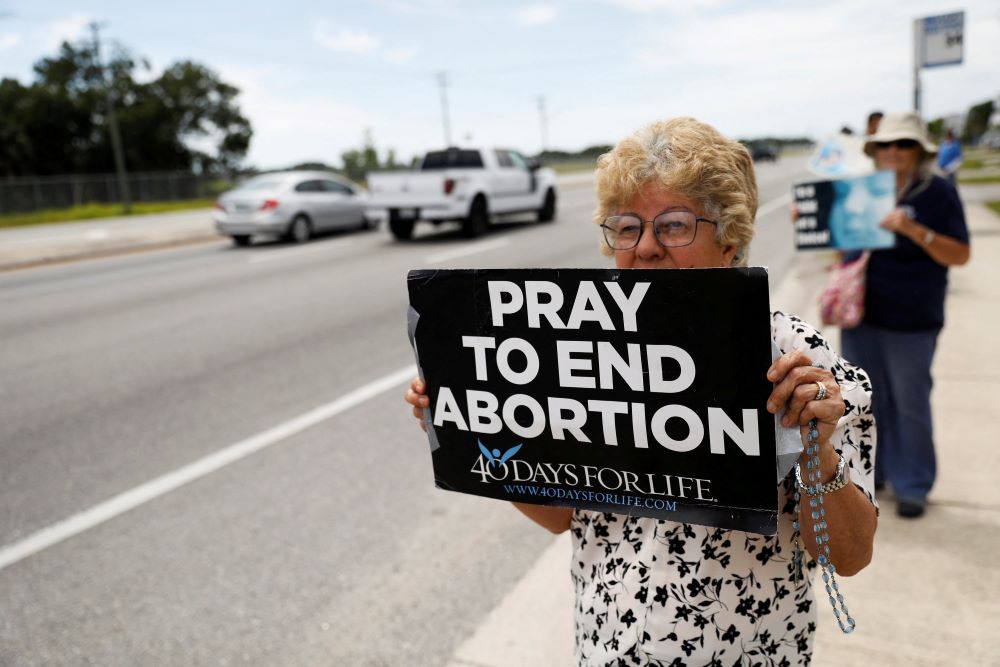
A pro-life protester holds a sign and rosary near Hillsborough County Community College where U.S. President Joe Biden was holding a campaign event in Tampa, Fla., April 23. (OSV News/Reuters/Octavio Jones)
Vice President Kamala Harris will be nominated by the Democratic Party this week for the presidency of the United States. In the few weeks since President Joe Biden announced he was dropping out of the race, she has not only united the party but she has also generated enormous enthusiasm.
In part because of the overriding need to prevent former president Donald Trump from regaining power, but also because of the political climate after the Supreme Court overturned Roe v. Wade, the Democratic National Convention will focus repeatedly on the party's commitment to abortion rights. The question is whether or not there will be any room left for pro-life Democrats.
Harris has made "freedom" a central focus of her campaign message, used in ads and campaign videos, and reproductive rights are explicitly included. Freedom is at the heart of the American story, from the pilgrims seeking religious freedom to the founders making liberty the very objective of our constitutional order, to the civil rights activists of the mid-20th century demanding our nation fulfill the true meaning of its creed. American history can be seen largely as our collective successes and failures at embodying freedom.
Those who advocate for abortion rights understand the right to abortion as part of this broader story of emancipation, especially for women. Our constitutional republic started with a narrow commitment to freedom, one which ignored the country's original sin of slavery and also failed to extend the right to vote to women for more than 125 years. In the latter half of the 20th century, having defeated fascism in World War II, a series of movements, for civil rights, for women's rights, for gay rights, for rights for the disabled, all are often seen as one, large, varied effort at expanding human freedom.
It is still possible for pro-life Democrats to vote for Harris this autumn in good conscience, especially given the alternative, but I fear the time is coming when conscience will demand leaving the party. Or acknowledging it has left us.
Some of us understand abortion rights differently. We see it as part of a narrative that Pope Francis has labeled the "globalization of indifference."
Just as liberalism was blind to the evil of eugenics in the early 20th century, pro-life Democrats see abortion rights as a kind of indifference to the moral significance of the unborn child. We can easily identify with the plight of a woman facing an unexpected or crisis pregnancy. We all know someone who has had an abortion and know those persons as good people, decent people, caring people. But we cannot simply set aside the moral fact that a choice, an exercise of freedom, which entails the destruction of human life, or potential human life, is at the very least morally problematic.
For Catholics, freedom is complicated, one of several principal goals of civic society. We do not root our understanding of freedom in Lockean ideas about a social contract, still less in contemporary libertarian ideas that see any infringement on personal choice as impermissible. For Catholics, freedom, even religious freedom, is rooted in human dignity and the necessity of searching for the truth. As the Second Vatican Council states in Dignitatis humanae:
It is in accordance with their dignity as persons-that is, beings endowed with reason and free will and therefore privileged to bear personal responsibility, that all men should be at once impelled by nature and also bound by a moral obligation to seek the truth, especially religious truth. They are also bound to adhere to the truth, once it is known, and to order their whole lives in accord with the demands of truth. However, men cannot discharge these obligations in a manner in keeping with their own nature unless they enjoy immunity from external coercion as well as psychological freedom. Therefore the right to religious freedom has its foundation not in the subjective disposition of the person, but in his very nature. In consequence, the right to this immunity continues to exist even in those who do not live up to their obligation of seeking the truth and adhering to it and the exercise of this right is not to be impeded, provided that just public order be observed.
What the council teaches about religious freedom pertains as well to other freedoms.
Freedom is not ambivalent, but neither is it the only value in civic life. Human dignity and the common good also make claims on the body politic. We Catholics support labor rights because the dignity of workers demands it, even if the freedom of corporations is thereby impinged. We Catholics support the rights of migrants to succor and shelter because their human dignity demands it, even if the host country must allocate resources to address their needs. We Catholics support a just distribution of societal resources because the common good demands it, even if taxes are, by nature, confiscatory. We support action to confront climate change because the common good and concern for human life demand it, even if such a confrontation will impose significant changes on our common life. On all these issues, Democrats eschew the libertarian position. On abortion, they embrace it.
Advertisement
As the Democrats gather in Chicago this week for their convention, pro-life Democrats worry that there may be no room for us anymore in this party to which we are committed. The big tent approach of the 1970s is gone. The days when Bill Clinton said he wanted abortion to be "safe, legal and rare" seem like a lifetime ago.
It is still possible for pro-life Democrats to vote for Harris this autumn in good conscience, especially given the alternative, but I fear the time is coming when conscience will demand leaving the party. Or acknowledging it has left us.







